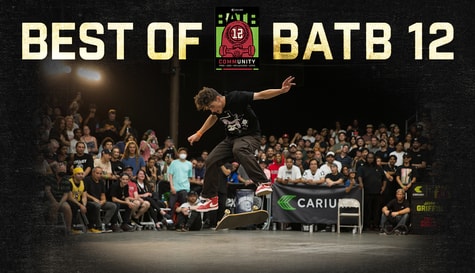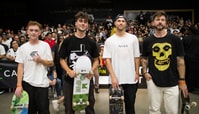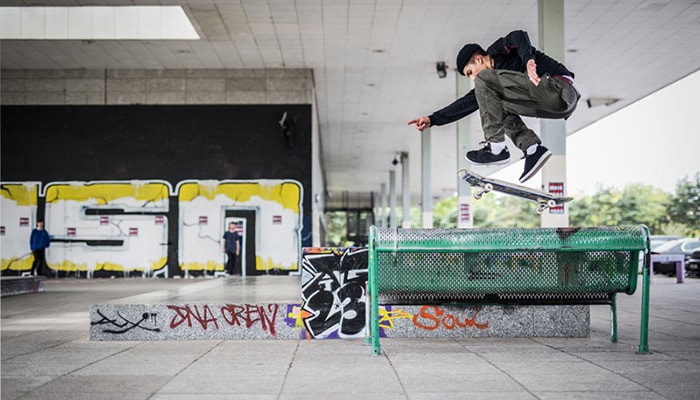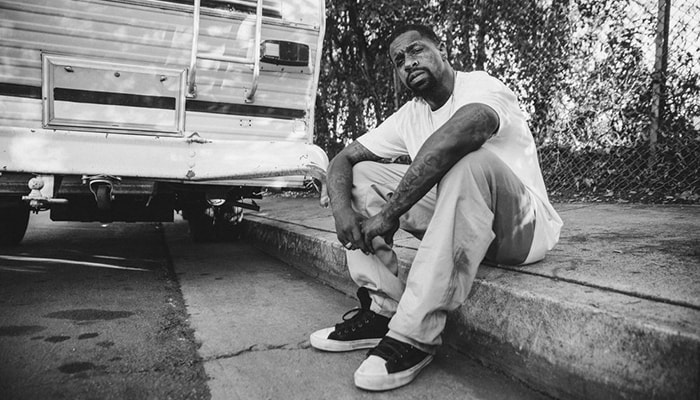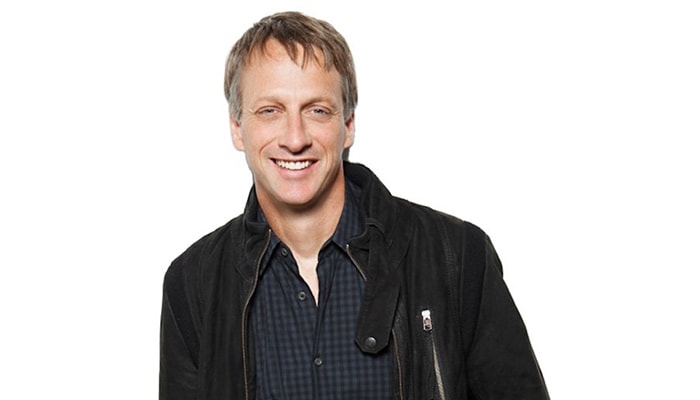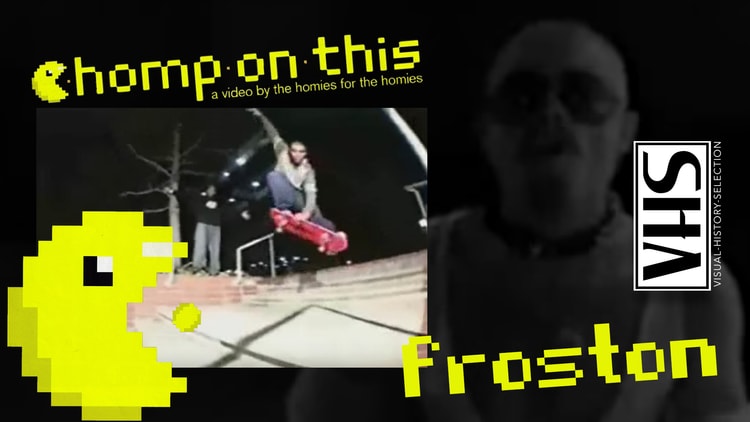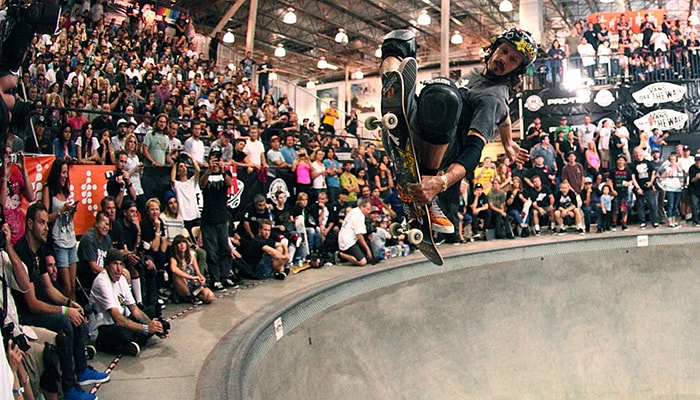READ OUR REVIEW OF ‘AVENGERS: INFINITY WAR’ — Berrics Film Society
WORDS: Alex Welch
There are a lot of well-known, iconic comic book names featured on the poster for Marvel Studios’ Avengers: Infinity War, and yet, despite that, none loom quite as large as one in particular: the film’s villain, Thanos (Josh Brolin). A character whose presence in the Marvel Cinematic Universe has been set up repeatedly in the six years since first appearance at the end of 2012’s The Avengers, and who—with Marvel Studios’ continued inability to create any more than a few memorable on screen villains—has quickly developed a reputation as the make or break character of the Marvel Cinematic Universe. A pressure that meant, should Thanos’s long-awaited full introduction be at all anticlimactic, then Infinity War would crumble under the weight of its own hype.
Fortunately, because screenwriters Christopher Markus and Stephen McFeely have chosen to treat Brolin’s purple-skinned Mad Titan as if he were the lead of Infinity War—with more total screen time than any of the other characters—Thanos very much lives up to his reputation. One whose mission to destroy half of every species in the universe, takes on deeper meaning and tragedy each time McFeely and Markus decide to unfold another chapter of Thanos’s past.
Courtesy of Avengers: Infinity War
The effort made to make the villain’s plight and emotions feel as legitimate as possible, is one of Infinity War’s most surprising and effective decisions. It was always obvious, after all, that Avengers: Infinity War would take a heavy toll on it’s heroes, but few could have seen just how far the film would go to also illustrate just how much Thanos has lost (and will continue to lose), by continuing with his mission. A choice by the film’s creative team which imbues the character with an unexpected level of sadness, brilliantly conveyed by Josh Brolin’s motion-capture performance.
By deciding to focus so heavily on the development and characterization of Thanos, though, many of the film’s returning heroes end up getting the short end of the stick this time around—particularly Chadwick Boseman’s Black Panther and Chris Evans’s Captain America. While that’s unavoidable due to the sheer number of characters that Infinity War is trying to juggle, it still doesn’t excuse how little of an impact some characters actually make on the film’s story, and in this more than any other Marvel title, the runtime feels like it is actively working against the film’s ensemble.
This leads to what are clearly meant to be some of the film’s biggest romantic relationships, feeling rushed and underdeveloped. A flaw that’s noticeably present when it comes to the bond between Scarlet Witch (Elizabeth Olsen) and Vision (Paul Bettany), no matter how much work both Olsen and Bettany put into selling Wanda and Vision’s feelings for each other. The intimacy of their relationship—following the events of Captain America: Civil War—feels so sped through that it’s hard not to view the scenes between them as anything other than just a last-minute attempt to wring more emotions out of the film’s built-in sense of impending doom.
Courtesy of Avengers: Infinity War
Not that Avengers: Infinity War has much to worry about on the emotional front, as all the substantial time we’ve spent with each of these heroes pays off in this film more than it ever has before. After making it clear very early on that nobody is as safe as you’d like to think they are, the tension of wondering which of these characters may or may not meet their end permeates throughout the entirety of the film, and gives Infinity War an affectingly visceral, edge-of-your-seat feel. Especially as it hurtles towards its final third, where the film’s emotional moments and colorfully bombastic action sequences merge together for what is, undoubtedly, one of Marvel’s best climaxes to date.
And while directors Anthony and Joe Russo understandably struggle here more than ever to maintain a consistent pace or balance their film’s lofty number of characters—the duo’s ability to bring comic book-sized set pieces to eye-popping life on the big screen has never been more refined or effective. The directors are in complete control of the action in Infinity War, beginning with a particularly thrilling and witty battle set in modern day Greenwich Village, a sequence that quickly makes it clear just how much more fun and stylish the Russos can get now that they have moved from the Captain America trilogy into the Avengers arena.
Whereas both The Winter Soldier and Civil War had predominantly focused on hand-to-hand based fights between their combatants, Infinity War offers a completely expansive scope of characters, with different power sets, for the Russos to utilize however they see fit. That includes Benedict Cumberbatch’s Doctor Strange, who uses his mastery of the mystic arts to conjure spells, optical illusions, and portals that teleport allies and enemies all over the battlefield – to endlessly memorable results. Never before has the Russos’ pop sensibilities behind the camera been more appreciated, as they balance the more eccentric visual tendencies of their MCU director counterparts like James Gunn or Taika Waititi, with the same mainstream rhythms of their Avengers predecessor, Joss Whedon.
Courtesy of Avengers: Infinity War
This talent at elevating even the most chaotic set pieces – of which there are one or two in Infinity War – helps the film to keep some sense of constant forward momentum, no matter how uneven it may seem. But if we’re all being perfectly honest with ourselves, there was never going to be a world where Avengers: Infinity War would be the most perfectly paced or consistent film. The demands it is being forced to meet, are simply too great for that. What it all comes down to then, is how effective Avengers: Infinity War is as an event film, where emotion and spectacle can often be allowed to rise above the more minute technical or structural issues. When looking at it from that perspective then, Avengers: Infinity War feels like a more-than-satisfying milestone moment for the Marvel Cinematic Universe. A film that engrosses you in its emotions and action with feverish clarity, earns whatever tears it will likely wring out of you, and offers up one of the most poetic comic book movie villains that the genre has ever seen.
SCORE: 4 infinity stones out of 5

Avengers: Infinity War hits theaters April 27.





